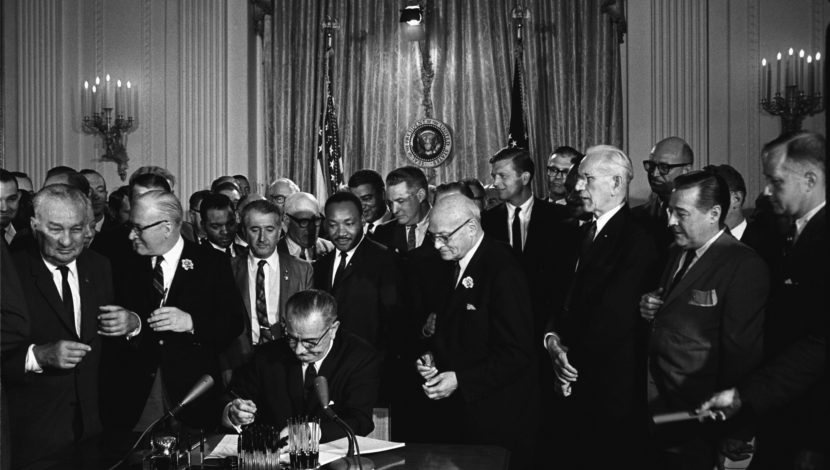The Unitarian Universalist Service Committee advances human rights through grassroots collaborations.
Honoring the Legacy of Civil Rights Pioneers

July 3, 2014
Yesterday marked the 50th anniversary of the landmark Civil Rights Act of 1964, an “act to to enforce the constitutional right to vote.” It was also this law that stated, “All persons shall be entitled to the full and equal enjoyment of the goods, services, facilities, and privileges, advantages, and accommodations of any place of public accommodation . . . without discrimination or segregation on the ground of race, color, religion, or national origin.” As we reflect on the historical importance of this critical legislation, I am reminded not only of how much progress was made in the 1960s but of how much we need to continue working to ensure equal political and civil rights for all.
A year ago, as the Supreme Court debated — and eventually invalidated — key provisions of the Voting Rights Act of 1965, I read an illuminating book about that other touchstone civil rights legislation. Check out my review below and read the book yourself. Then, I urge you to consider what actions you’d like to take to truly honor and continue the legacy of our country’s civil rights pioneers.
I’ve just finished reading Count Them One by One: Black Mississippians Fighting for the Right to Vote, a valuable book about United States v. Theron Lynd, a 1961 case that paved the way for the Voting Rights Act of 1965.
Theron Lynd was a voting registrar in Forrest County, Miss., who methodically denied the African American residents of his county their right to vote. Count Them One by One — written by Gordon A. Martin, Jr., one of the Justice Department lawyers who interviewed witnesses and helped prepare the case — focuses on the 16 brave black witnesses who testified against Lynd.
Among them were Addie Burger, a school teacher; T. F. Williams, a union worker at a local manufacturing plant; and Vernon Dahmer, a community leader and activist who was later killed in 1966, after the Ku Klux Klan caught wind of his plans to collect poll taxes from would-be voters to turn into local officials.
These individuals and the 13 others who joined them had attempted to register to vote — time and time again. They were told to come back another day. They were expected to jump through hoops while their white counterparts were waved along. They filled out applications that were, without explanation, deemed unfit. They were given bogus reapplication timelines.
Thanks to their testimony, Lynd was eventually convicted for contempt of court, African Americans in Forrest County began to register, and the case made other legal challenges to voter discrimination in the South possible. The Voting Rights Act of 1965 went on to suspend literacy tests, appoint federal examiners and poll watchers, and more.
In [2013 Supreme Court hearings on the Voting Rights Act], Justice Sonia Sotomayor remarked to one of the lawyers challenging the case, “Do you think that racial discrimination in voting has ended, that there is none anywhere?” I would answer no to that question. And that is why this book is important.
In today’s political climate — with voter ID laws, sketchy redistricting plans, mythical “voter fraud,” and woefully inadequate polling stations in communities of color where people end up waiting hours on end to cast their ballots — it’s vital that we revisit the stories of the people who worked so hard for the right and the reality to vote. United States v. Theron Lynd wasn’t that long ago — my mom was already alive during the case — but as a new generation comes of age, these stories and all that they have to teach us are in danger of being forgotten or lost or overlooked.
That’s why I’m heartened to read this book highlighting those 16 individuals. And heartened that opportunities like the UU College of Social Justice’s Mississippi Civil Rights Journey exist. As we work to make sure that civil rights — and human rights — are upheld, we must keep in mind the words of Vernon Dahmer: “If you can’t vote, you don’t count.”

